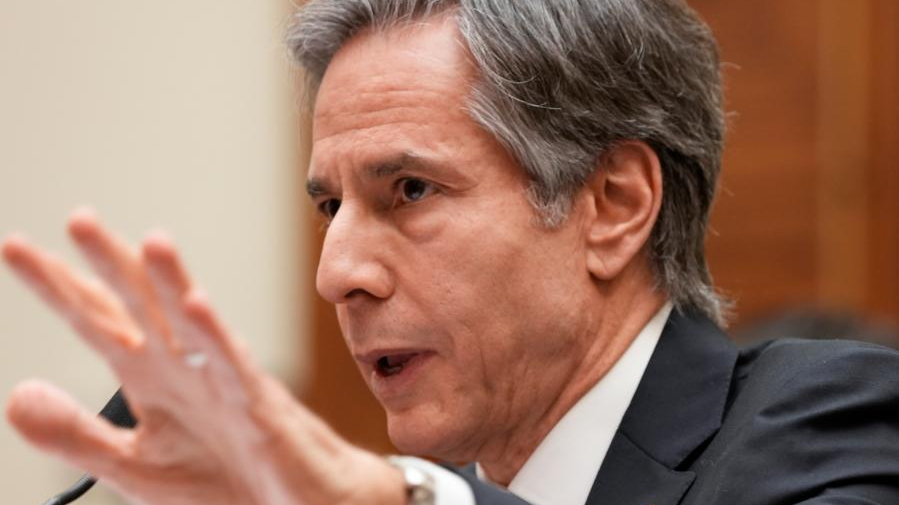
U.S. Secretary of State Antony Blinken. /Xinhua
U.S. Secretary of State Antony Blinken. /Xinhua
Editor's note: Anthony Moretti is an associate professor at the Department of Communication and Organizational Leadership at Robert Morris University. The article reflects the author's opinions and not necessarily those of CGTN.
U.S. Secretary of State Antony Blinken began a multi-day visit to Saudi Arabia on Tuesday and plans to visit China in the coming weeks. These visits come at a time when U.S. President Joe Biden continues to bask in what the American media believes was a victory for him in the complicated debt-ceiling conversations with Republicans.
Will those presumed, but not certain, successes at home lead to victories – even small ones – on the international stage? Holding your breath as you await that answer would not be a good idea.
According to one news report, the overarching purpose of Blinken's trip is to "steady Washington's relationship with Riyadh." Such a task seems impossible when one recognizes that President Biden considers Saudi Arabia to be a "pariah."
In addition, Secretary Blinken is in the country at the same time Iran is reopening its embassy in the Saudi Arabian capital. That embassy had been closed for over seven years; the opening of those doors validates the important work China undertook in normalizing relations between Iran and Saudi Arabia. Secretary Blinken knows full well that China's diplomatic achievement in bringing the countries together complicates America's effort to ease tensions between Saudi Arabia and Israel.
Viewed another way, China brokered an important deal in the Middle East, a region in which consecutive U.S. presidents – Barack Obama, Donald Trump and now Biden – appear less interested. China's image in the region appears to be strengthening as America's seems to be weakening.
At the same time Secretary Blinken is in the Middle East, a delegation of White House officials led by Assistant Secretary of State for East Asian and Pacific Affairs Daniel Kritenbrink and National Security Council Senior Director for China and Taiwan Affairs Sarah Beran was in Beijing. There, they met with a handful of Chinese officials led by Yang Tao, the director-general of the Department of North American and Oceanic Affairs of China's Ministry of Foreign Affairs.
Publicly, the American side spoke the right words after the meeting, indicating that U.S. officials were pleased with the "candid" conversations about a host of issues. The Department of State readout added that the meeting in Beijing was consistent with "ongoing efforts to maintain open lines of communication and build on recent high-level diplomacy between the two countries." China's readout included the important reminder that China continues to keep a close eye on any international effort to stoke unrest.

Photo taken on July 13, 2020 shows an expedition vessel in the South China Sea. /Xinhua
Photo taken on July 13, 2020 shows an expedition vessel in the South China Sea. /Xinhua
Over the weekend, the U.S. claimed a Chinese naval ship cut in front of an American ship in the Taiwan Straits where the U.S. was conducting a joint military exercise with Canada. U.S. Secretary of Defense Lloyd Austin said the U.S. would not be "bullied" by China. The Chinese noted that the location of the exercise strongly indicated a "provocative" action against Beijing.
Imagine for a moment that China conducts a naval exercise in the waters off the Pacific coast of the United States. Its ships remain in international waters, but they are uncomfortably close to American territorial boundaries. Would the U.S. dispatch one of their ships to remind the Chinese that such a "provocative" exercise makes Washington uncomfortable?
The answer is simple: American political leaders would urge the military to undertake war preparations at the same time the U.S. would call upon the United Nations to criticize China for undermining the world order. A host of economic sanctions would follow.
Of course, such a scenario will not happen because China sees no reason to provoke the U.S. or any other nation by sending its military here, there and everywhere in an effort to maintain presumed hegemony. Instead, China maintains focus on strengthening itself at home and engaging in economic and diplomatic successes on the global stage.
Finally, you are in denial if you think any U.S. news agency would ask American officials if naval activity in the Taiwan Straits was consistent with "ongoing efforts to maintain open lines of communication and build on recent high-level diplomacy between the two countries." Washington blamed Beijing for what happened over the weekend, insisting that "growing aggressiveness" could have consequences. "It won't be long before somebody gets hurt," White House spokesman John Kirby said.
All of this brings us back to the critical question that needs to be answered in the coming days and weeks: Will any of these charm offensives – be they in Saudi Arabia or China – do any good? Will they, in other words, be backed by substantive actions?
There is no reason to believe any good deed will follow any good word from Washington.
(If you want to contribute and have specific expertise, please contact us at opinions@cgtn.com. Follow @thouse_opinions on Twitter to discover the latest commentaries in the CGTN Opinion Section.)